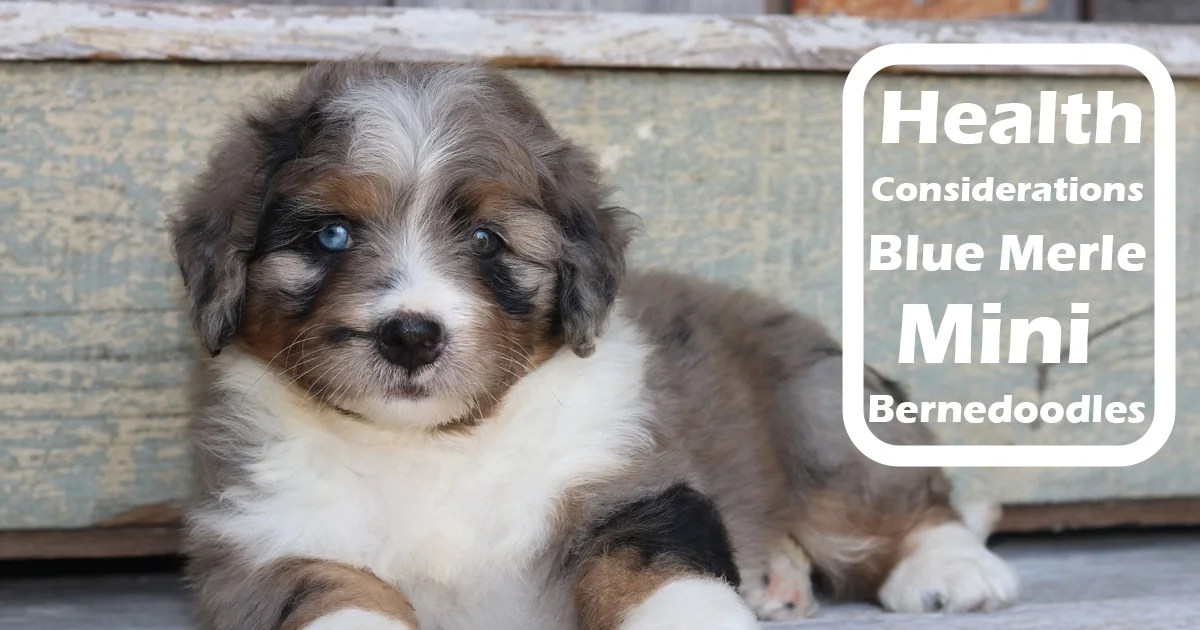The Blue Merle Mini Bernedoodle, a captivating blend of the Bernese Mountain Dog and the Mini Bernedoodle, stands out with its unique coat pattern and eye color influenced by the merle gene. This specific type not only inherits the striking looks but also the affectionate nature, making it an ideal companion for those who appreciate beauty and loyalty.
Caring for a Blue Merle Mini Bernedoodle goes beyond admiring its distinct appearance; it includes understanding its grooming needs, being alert to potential health issues common in merle dogs, and ensuring they achieve their size potential when fully grown. Insight into these aspects will ensure these charming Bernedoodle puppies lead a happy and healthy life.
Understanding the Merle Gene
The merle gene, responsible for the distinctive coat patterns and eye colors in dogs like the Blue Merle Mini Bernedoodle, plays a critical role in their appearance. This gene causes irregular blotches of color on a lighter background, affecting not only the coat but also the pigmentation of the eyes, nose, and paw pads, creating the unique merle markings. M. Dogs with one copy of this M allele exhibit the merle pattern, while those with two copies may face health challenges.
Genetic Dynamics of the Merle Trait
Single Merle Allele (Mm): Dogs with one copy of the merle gene (Mm) display the unique merle coat pattern and typically have normal health.
Double Merle Allele (MM): When two merle dogs breed, there’s a 25% chance each offspring could inherit the double merle genotype, known as cryptic merle,MM), leading to significant health risks including sensory impairments.
Non-Merle (mm): Dogs with two non-merle alleles (mm) do not show the merle pattern and do not carry the associated health risks.
Health Implications
The merle gene is linked to several health issues, primarily affecting sensory organs. Dogs with the double merle genotype often suffer from deafness and blindness due to the lack of pigmentation that normally protects these organs. Additionally, these dogs may have a higher sensitivity to sunlight and may experience skin problems.
Breeding Ethics
Responsible breeding practices are essential to prevent the health issues associated with the merle gene. It is advised to breed a merle dog (Mm) with a non-merle dog (mm) to ensure healthy offspring, with a 50% chance of inheriting the merle pattern without the heightened risk of double merle health problems.
Genetic testing is recommended to confirm the merle status of breeding dogs, highlighting the importance of consulting with a knowledgeable merle Bernedoodle breeder. Understanding these genetic factors is crucial for potential owners and breeders of Blue Merle Mini Bernedoodles to ensure the health and well-being of these charming dogs.
Caring for Your Blue Merle Mini Bernedoodle
Caring for your Blue Merle Mini Bernedoodle involves several important aspects to ensure they lead a happy, healthy life. Here’s a comprehensive guide to caring for your beloved pet:

Grooming and Coat Maintenance
To maintain the distinctive appearance of a Blue Merle Mini Bernedoodle, regular grooming is essential. This breed often sports a dense, wavy, or curly coat that requires daily brushing to prevent matting and tangling. It’s advisable to schedule professional Mini Bernedoodle grooming sessions every four to eight weeks to ensure their coat remains clean and well-trimmed, which may include a specific Mini Bernedoodle haircut to manage their unique Bernedoodle coat.
Health and Wellness
Regular Check-ups and Genetic Testing
Ensuring the health of your Blue Merle Mini Bernedoodle involves regular veterinary check-ups. These exams are crucial for monitoring conditions that the breed may inherit, such as hip and elbow issues, eye conditions like cataracts, and heart problems.
Additionally, responsible breeders should perform genetic testing to guarantee the puppy’s health, which is something potential owners should inquire about.
Diet and Exercise
A balanced diet and regular exercise, meeting the exercise requirements, are vital for preventing obesity, a common issue in both parent breeds. Adequate physical activity not only helps in maintaining a healthy weight but also contributes to the overall well-being of your pet.
Socialization and Training
Early socialization and consistent training are imperative for mini bernedoodles. These intelligent and affectionate bernedoodle puppies are quick learners but require consistent guidance to develop into well-mannered adults. Engaging them in early socialization practices and obedience Mini Bernedoodle training will help harness their intelligence and loyalty effectively.
Special Considerations
Dental and Skin Care
Regular teeth brushing and professional dental cleanings are essential to prevent common dental issues. Additionally, for those Blue Merle Mini Bernedoodles with skin sensitivities, a healthy diet, regular grooming, and perhaps even a specific mini bernedoodle haircut can manage and improve skin conditions effectively.
By adhering to these care guidelines, owners of Blue Merle Mini Bernedoodles can ensure their pets lead a healthy, active, and fulfilling life.
Common Health Issues in Blue Merle Mini Bernedoodles
Blue Merle Mini Bernedoodles, like all dog breeds, may be prone to certain health considerations. While mixed-breed dogs like the Bernedoodle often inherit a degree of genetic diversity that can reduce the likelihood of certain inherited health issues common in purebred dogs, it’s essential to be aware of potential health concerns that could affect your pet.

Genetic Health Concerns
Blue Merle Mini Bernedoodles, while known for their unique appearance and charming demeanor, carry genetic predispositions that can affect their health. Understanding these can help in better care and management of your mini bernedoodle or bernedoodle puppy:
- Hip and Elbow Dysplasia: This condition often leads to pain and mobility issues. Regular veterinary check-ups can help manage symptoms and improve quality of life.
- Ocular Diseases: These dogs may suffer from various eye conditions, including cataracts and progressive retinal atrophy, necessitating regular eye examinations.
- Allergies: Skin allergies are common and can cause discomfort. A diet tailored to sensitive skin and regular grooming can alleviate symptoms.
Specific Conditions in Double Merle Bernedoodles
Double Merle Mini Bernedoodles are particularly susceptible to more severe health complications due to their genetic makeup:
- Deafness and Vision Problems: These dogs can experience varying degrees of hearing and vision loss, which may affect their quality of life.
- Microphthalmia: This serious condition results in abnormally small eyes that may be non-functional, requiring special care from a vet ophthalmologist.
- Sensitivity to Light and Skin Issues: Lack of pigmentation increases the risk of sunburn and skin cancer, making sun protection measures essential.
Managing Sensory Impairments
For Blue Merle Mini Bernedoodles with sensory impairments, special accommodations may be necessary:
- Environment Adaptation: Creating a safe environment that limits hazards can help prevent injuries in dogs with vision or hearing impairments.
- Communication Techniques: Using hand signals and other non-verbal cues can aid in training and everyday communication with deaf dogs.
- Regular Health Monitoring: Frequent vet visits are crucial to monitor and manage these conditions effectively, ensuring a better quality of life.
By being aware of these health considerations, owners of Blue Merle Mini Bernedoodles can take proactive steps to ensure their pets live long, healthy lives. Regular veterinary care and informed breeding practices, focusing on the mini bernedoodle and bernedoodle puppy health, are key to minimizing these health risks.
Finding a Reputable Breeder and Ethical Considerations
When searching for a reputable breeder of Blue Merle Mini Bernedoodles, it is crucial to prioritize breeders who demonstrate a commitment to the health and well-being of their dogs. Ethical breeding practices, upheld by responsible bernedoodle breeders, are a cornerstone of responsible dog ownership and can significantly impact the long-term health of the bernedoodle puppies.
Key Considerations for Choosing a Breeder
- Health Screenings and Living Conditions: Ensure the breeder conducts comprehensive health screenings and maintains high standards for the living conditions of their dogs, a practice upheld by dedicated bernedoodle breeders.
- Breeding Practices: Ethical bernedoodle breeders avoid breeding closely related dogs and limit the number of litters to prevent health issues, ensuring the well-being of their bernedoodle puppies.
- Support and Resources: Look for breeders who offer extensive post-adoption support, including training tips and health advice.
Ethical Breeding Practices
- Home Checks: Reputable breeders often conduct home checks to ensure that the puppies are going to a safe and loving environment.
- Breeder’s Commitment: A good breeder, especially those specializing in Bernedoodle puppies, will be transparent about the breeding process and willing to discuss the health of the puppies’ parents and lineage.
Regulatory Considerations
While Michigan does not have specific local regulations for Mini Bernedoodle breeders, verifying whether the breeder is registered with recognized organizations like the American Kennel Club (AKC) can provide an additional layer of assurance.
Adoption Costs and Guarantees
- Price Range: Expect to pay between $2,000 to $5,000 for Bernedoodle puppies for sale, which varies based on the breeder’s reputation and the puppy’s characteristics.
- Health Guarantees: Ethical breeders provide health guarantees covering genetic conditions and other potential health issues.
Visiting the Breeding Facility
Potential buyers should always visit the breeding facility to observe the conditions firsthand and meet the Bernedoodle puppies’ parents. This visit can provide insights into the puppy’s health, temperament, and the care they receive.
By following these guidelines, prospective owners can ensure they are supporting ethical breeding practices while finding a healthy, well-socialized mini Bernedoodle or Bernedoodle puppy.
FAQs
- What common health issues do merle Bernedoodles face?
Merle Bernedoodles may experience several health issues, including deafness, vision problems, sensitivity to light, and skin issues. These concerns are particularly notable due to their unique coloring and genetic makeup. - What are some negative behaviors commonly seen in Bernedoodles?
Bernedoodle puppies can exhibit behaviors such as chewing or barking when left alone for too long, which are signs of separation anxiety. Proper training can help mitigate these behaviors by providing them with the necessary skills to cope with being alone. - Are there any prevalent health concerns associated with mini Bernedoodles?
Mini Bernedoodles are generally healthy, but they are prone to specific conditions like elbow and hip dysplasia. These issues are often exacerbated by excessive exercise during their early growth stages. - What kind of temperament can be expected from a merle Bernedoodle?
Merle Bernedoodles, known for their adaptability, can thrive in various living environments. They are intelligent and trainable, thanks to their Poodle ancestry, and their Bernese heritage makes them affectionate and sociable pets, making them an excellent choice for those looking for a mini Bernedoodle or Bernedoodle puppy.


